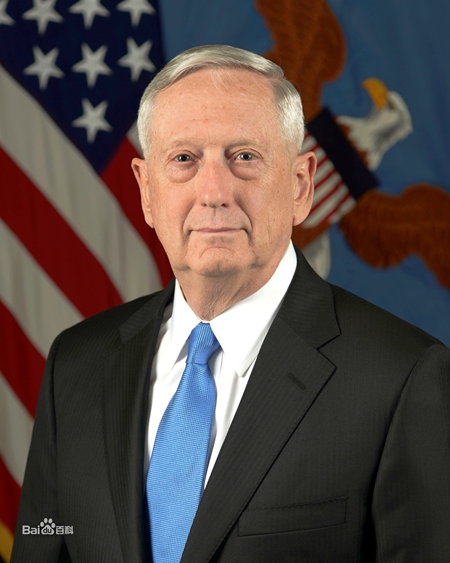America in search of new threats
- By Sajjad Malik
 0 Comment(s)
0 Comment(s) Print
Print E-mail China.org.cn, January 24, 2018
E-mail China.org.cn, January 24, 2018

U.S. Secretary of Defense James Mattis [File photo]
The focus of national security discourse in the United States is transiting towards traditional threats after a reduction in the scale of the menace of terrorism. It was the crux of the speech given by Secretary of Defense James Mattis in Washington who said that competition between great powers is the main emerging danger.
The U.S. policymakers believe that groups like al-Qaeda in Afghanistan-Pakistan region and ISIS in the Middle East have been considerably weakened after about two decades of counter terrorism efforts and direct wars. But in the same period, new power centers have emerged to challenge the U.S. hegemony.
Mattis, in the Washington speech, identified China and Russia as the new sources of future threats. He said: "We face growing threats from revisionist powers as different as China and Russia, nations that seek to create a world consistent with their authoritarian models."
He also warned that America's competitive edge was fast eroding and the new powers were catching up through technology and better resource allocation. He made a plea for more funds to modernize the war machine.
American fears vis-à-vis Russia have been well known and calibrated. They are old and based on the suspected Russian dream to sweep across Europe. The threat is also a matter of perception nurtured through extensive propaganda since the Cold War days.
The revival of Russian fortunes under the dogged determination of Vladimir Putin has been amazing. When he burst on the political scene at the dawn of the new millennium, Russia was facing the threat of a further breakup due to conflict in Chechnya. The economy was in mess and peoples' morale down to the knees.
To his credit, Putin picked the broken pieces and transformed the economy and military power of the country. Though, it came at a price and the Russian march towards liberal democracy hit snags. But Putin was able to put his nation back on the map of world powers within a decade. It might have alarmed many in America.
The story of China is different. China and the U.S. were in the same camp in the second half of the Cold War to oppose the leadership of the USSR. The two have regularly engaged even after the fall of the Soviet Union. Currently, they are cooperating on North Korea and other issues.
China's success in the recent decades is not due to occupation of any country or fighting proxy wars or funding those groups that are fighting against the U.S. power. Its success lies in building successful economic ties across the globe, including being the largest trade partner of the United States.
The Chinese leadership has so far not shown any desire for hegemonic policies in regional or global politics. Rather, it has been trying to replace competitive policies with cooperative relationships by following the philosophy of "win-win cooperation" for benefits of all.
American view of China's threat seems exaggerated. China would gradually increase involvement in the international arena but it might never become part of conflicts or openly take sides in active wars because it needs a lot of time to overcome domestic issues. Being a huge country of diverse cultures and people, it needs peace at its border and within to continue its peaceful rise.
But China also learnt through past mistakes that weakness invites aggression. It has been trying to have a formidable defense machine to keep the adventurers at bay. Its aircraft carriers, technology, fast growing economy and interest in deep space are efforts to make the defense better but not necessarily to target others.
The American idea to treat China like Russia does not resonate with the policy of its administration to increase cooperation with Beijing. The narrative doesn't fit within the economic relationship when Donald trump is trying to address the imbalance in trade.
Mattis' announcement to return to age old policies of realpolitik means that the world has learnt nothing from the destructive politics of last century. Why seek confrontation when there is huge scope for cooperation between big powers?
Another flaw in Mattis' approach is that it is still early to shift the focus away from the war on terror. The conflict in Afghanistan, Iraq, Syria, Libya and Somalia is very much ongoing. It would be dangerous to open a new front with Russia or China when their cooperation is needed to end these wars and completely eliminate the threat of militancy.
Sajjad Malik is a columnist with China.org.cn. For more information please visit:
http://www.china.org.cn/opinion/SajjadMalik.htm
Opinion articles reflect the views of their authors, not necessarily those of China.org.cn.






Go to Forum >>0 Comment(s)